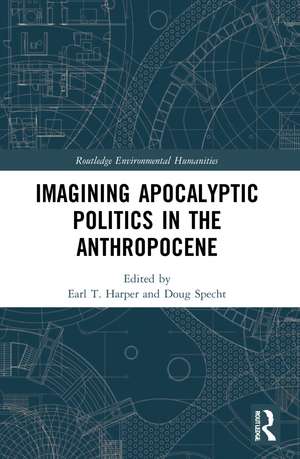Imagining Apocalyptic Politics in the Anthropocene: Routledge Environmental Humanities
Editat de Earl T. Harper, Doug Spechten Limba Engleză Paperback – 31 mai 2023
Featuring a number of creative interventions exclusively produced for the work from artists and fiction writers who engage with the themes of apocalypse, decline, catastrophe and disaster, this innovative book will be of great interest to students and scholars of the politics of climate change, the environmental humanities, literary criticism and eco-criticism.
| Toate formatele și edițiile | Preț | Express |
|---|---|---|
| Paperback (1) | 328.68 lei 6-8 săpt. | |
| Taylor & Francis – 31 mai 2023 | 328.68 lei 6-8 săpt. | |
| Hardback (1) | 1002.18 lei 6-8 săpt. | |
| Taylor & Francis – 29 sep 2021 | 1002.18 lei 6-8 săpt. |
Din seria Routledge Environmental Humanities
-
 Preț: 295.40 lei
Preț: 295.40 lei -
 Preț: 289.51 lei
Preț: 289.51 lei -
 Preț: 302.45 lei
Preț: 302.45 lei -
 Preț: 303.87 lei
Preț: 303.87 lei -
 Preț: 294.99 lei
Preț: 294.99 lei -
 Preț: 288.41 lei
Preț: 288.41 lei -
 Preț: 386.31 lei
Preț: 386.31 lei -
 Preț: 340.64 lei
Preț: 340.64 lei -
 Preț: 281.14 lei
Preț: 281.14 lei -
 Preț: 310.51 lei
Preț: 310.51 lei -
 Preț: 280.72 lei
Preț: 280.72 lei -
 Preț: 369.99 lei
Preț: 369.99 lei -
 Preț: 288.72 lei
Preț: 288.72 lei -
 Preț: 303.87 lei
Preț: 303.87 lei -
 Preț: 326.78 lei
Preț: 326.78 lei -
 Preț: 311.41 lei
Preț: 311.41 lei -
 Preț: 288.37 lei
Preț: 288.37 lei -
 Preț: 191.93 lei
Preț: 191.93 lei -
 Preț: 347.73 lei
Preț: 347.73 lei - 18%
 Preț: 1050.78 lei
Preț: 1050.78 lei - 20%
 Preț: 1046.91 lei
Preț: 1046.91 lei - 28%
 Preț: 821.14 lei
Preț: 821.14 lei -
 Preț: 446.53 lei
Preț: 446.53 lei - 18%
 Preț: 1001.84 lei
Preț: 1001.84 lei -
 Preț: 441.74 lei
Preț: 441.74 lei - 26%
 Preț: 850.17 lei
Preț: 850.17 lei - 18%
 Preț: 1001.84 lei
Preț: 1001.84 lei -
 Preț: 369.95 lei
Preț: 369.95 lei -
 Preț: 415.24 lei
Preț: 415.24 lei - 18%
 Preț: 1001.07 lei
Preț: 1001.07 lei - 18%
 Preț: 1054.71 lei
Preț: 1054.71 lei - 18%
 Preț: 1000.87 lei
Preț: 1000.87 lei - 26%
 Preț: 819.09 lei
Preț: 819.09 lei - 18%
 Preț: 1171.19 lei
Preț: 1171.19 lei - 18%
 Preț: 1000.27 lei
Preț: 1000.27 lei - 16%
 Preț: 277.74 lei
Preț: 277.74 lei - 18%
 Preț: 1000.27 lei
Preț: 1000.27 lei -
 Preț: 403.91 lei
Preț: 403.91 lei - 15%
 Preț: 297.57 lei
Preț: 297.57 lei - 18%
 Preț: 1002.63 lei
Preț: 1002.63 lei - 18%
 Preț: 1053.16 lei
Preț: 1053.16 lei - 13%
 Preț: 297.99 lei
Preț: 297.99 lei - 18%
 Preț: 1004.20 lei
Preț: 1004.20 lei
Preț: 328.68 lei
Nou
Puncte Express: 493
Preț estimativ în valută:
62.89€ • 65.66$ • 52.05£
62.89€ • 65.66$ • 52.05£
Carte tipărită la comandă
Livrare economică 05-19 aprilie
Preluare comenzi: 021 569.72.76
Specificații
ISBN-13: 9780367653125
ISBN-10: 0367653125
Pagini: 252
Ilustrații: 13 Halftones, black and white; 13 Illustrations, black and white
Dimensiuni: 156 x 234 x 13 mm
Greutate: 0.66 kg
Ediția:1
Editura: Taylor & Francis
Colecția Routledge
Seria Routledge Environmental Humanities
Locul publicării:Oxford, United Kingdom
ISBN-10: 0367653125
Pagini: 252
Ilustrații: 13 Halftones, black and white; 13 Illustrations, black and white
Dimensiuni: 156 x 234 x 13 mm
Greutate: 0.66 kg
Ediția:1
Editura: Taylor & Francis
Colecția Routledge
Seria Routledge Environmental Humanities
Locul publicării:Oxford, United Kingdom
Public țintă
Postgraduate and Undergraduate AdvancedNotă biografică
Earl T. Harper is an Independent Scholar.
Doug Specht is a Senior Lecturer in the School of Media and Communication at the University of Westminster, UK.
.
Doug Specht is a Senior Lecturer in the School of Media and Communication at the University of Westminster, UK.
.
Cuprins
Introduction: ... these unprecedented times Earl T. Harper and Doug Specht 1. They say "our house is on fire" – on the climate emergency and (new) Earth politics Edward H. Huijbens and Martin Gren 2. Do not go gentle into that good night: contested narratives and political subjectivities in the Anthropocene Carlos Tornel and Aapo Lunden 3. The end of worlding: indigenous cosmologies in the Anthropocene Mariana Reyes-Carranza 4. Apocalypse repeated: the absence of theindigenous subject in George Turner’s The Sea and Summer (1987) Charlotte Lancaster 5. Apocalyptic Literary Geographies: The Tempest’s ‘brave new world,’ Frankenstein’s ‘modern Prometheus,’ and Cloud-Atlas’ ‘ furthest-eeein’ eye’ Charles Travis 6. A world without bodies: geotrauma and the work of mourning in Jorie Graham's Fast Philip Jones 7. Meaningful life at the end of times: ageism and the duty-to-die in Logan’s Run James A. Tyner 8. The catastrophic drive Lucas Pohl and Samo Tomšič 9. The self(ie) in the Anthropocene Doug Specht and Cat Snyder 10. Urbicide in the Anthropocene: imagining Miami futures Stephanie Wakefield 11. Triggering the apparitions: spectres of chemical seascapes María Soledad Castro Vargas and Diana Barquero Pérez 12. Study for "Memories of the apocalypse" Carl Christian Olsson 13. Variegated environmental apocalypses: post-politics, the contestatory, and an eco-precariat manifesto for a radical apocalyptics Tristan Sturm and Nicholas Ferris Lustig
Descriere
Bringing together scholars from English literature, geography, politics, the arts, environmental humanities and sociology, this book contributes to the emerging debate about how apocalyptic events, narratives and imaginaries interact with societal and individual agency historically and in the current political moment.
